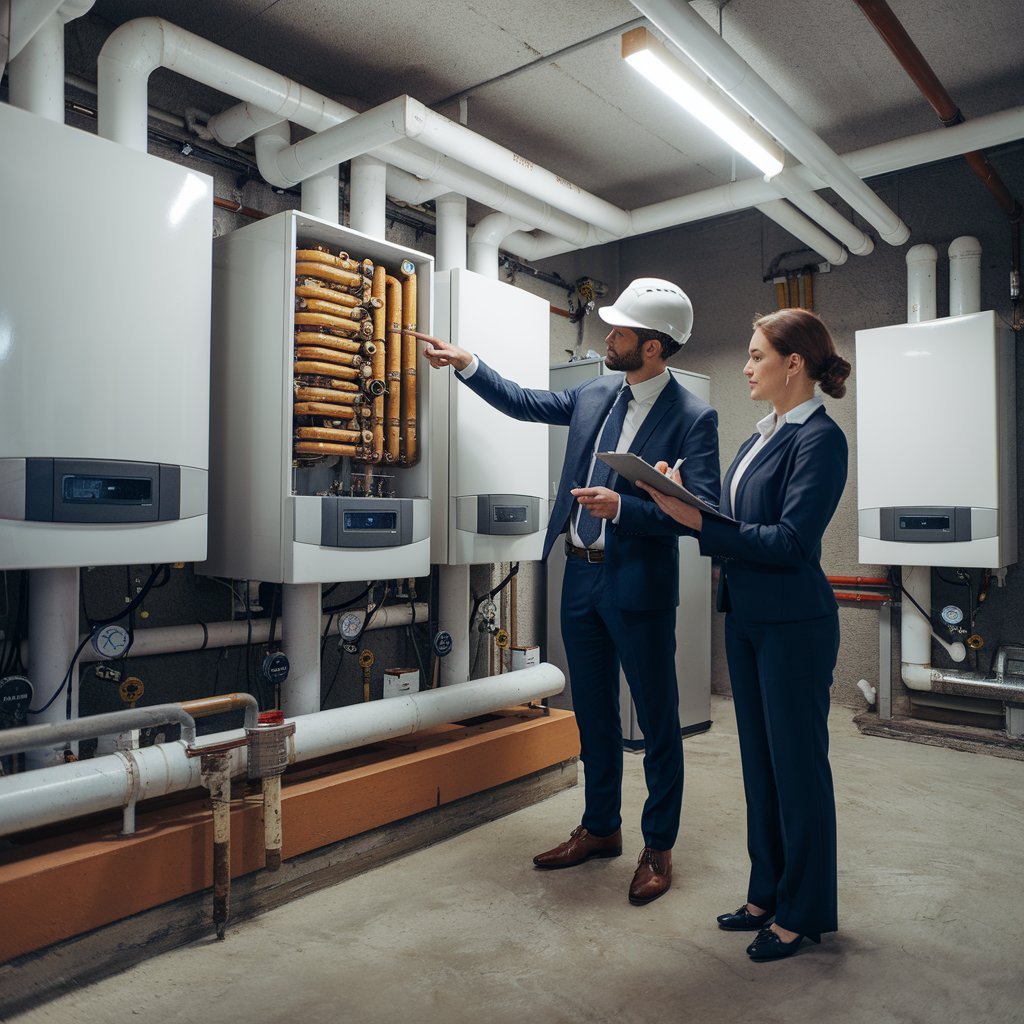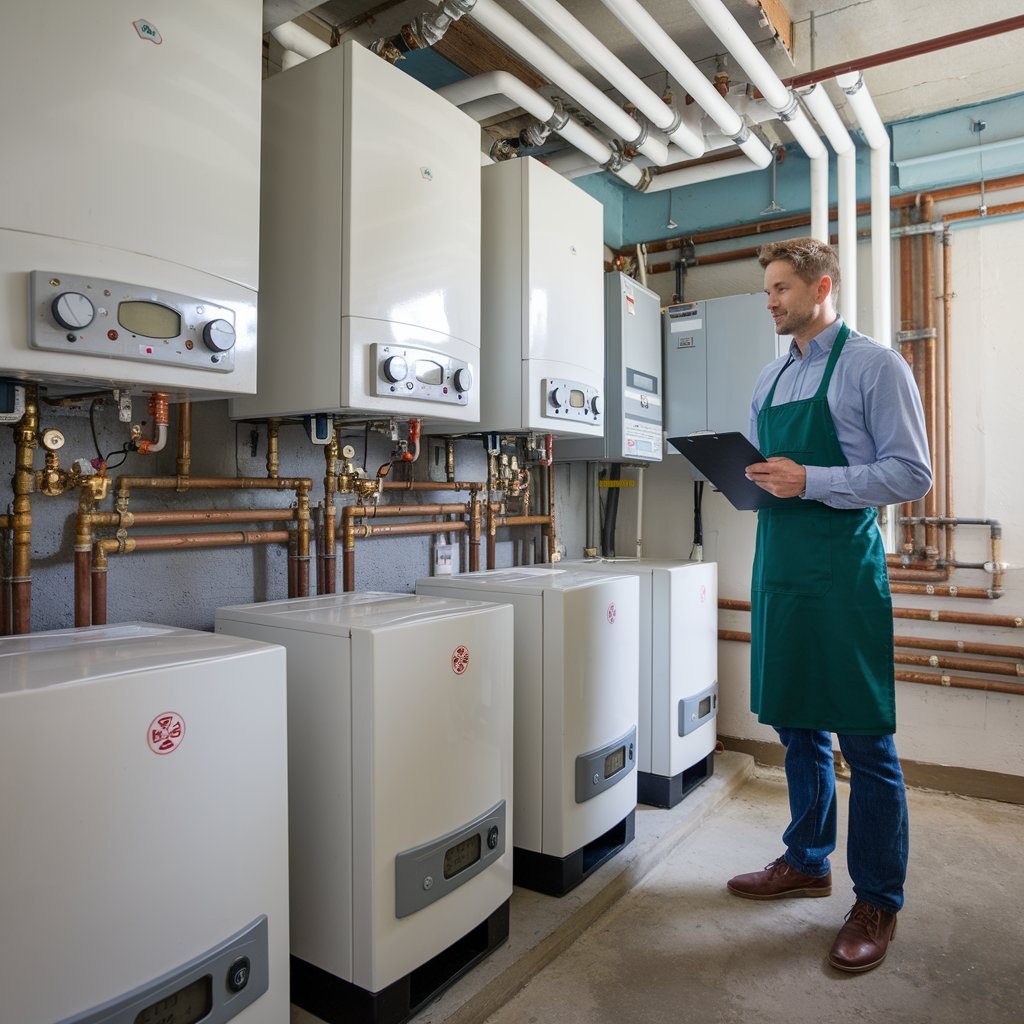Selecting the right gas boiler is a critical decision for any property owner. Whether you’re upgrading an old system or installing one in a new building, the boiler you choose will significantly impact your energy efficiency, heating costs, and overall comfort. With numerous options available, it’s important to consider your building’s specific needs, energy efficiency goals, and budget.
This guide will help you navigate the process of choosing the ideal gas boiler, highlighting key factors, types of boilers, and tips for making the best decision.
Understanding the Role of a Gas Boiler
A gas boiler is a central heating system that operates by burning natural gas or liquefied petroleum gas (LPG) to heat water. This heated water is then circulated through radiators, underfloor heating systems, or hot water taps. Acting as the core of your heating setup, the boiler ensures your home remains warm and cosy during colder weather while supplying a dependable source of hot water.
Choosing the right boiler means balancing performance, efficiency, and cost-effectiveness. Getting it wrong can lead to insufficient heating, higher energy bills, or frequent breakdowns.
Factors to Consider When Choosing a Gas Boiler

1. Type of Building
The size and purpose of your building are crucial factors. For example:
- Residential Homes: Smaller boilers are usually sufficient, but larger homes with more bathrooms may require higher output.
- Commercial Buildings: These often demand larger or multiple boilers to meet high heating and hot water needs.
- Apartments or Multi-Unit Buildings: Centralized heating systems or cascade boiler setups are often more efficient.
2. Boiler Types
There are three main types of gas boilers, each with unique features and suitability:
- Combi Boilers (Combination Boilers):
- Heat water on demand without the need for a storage tank.
- Ideal for smaller homes with limited space.
- Provide instant hot water but may struggle to supply multiple outlets simultaneously.
- System Boilers:
- Use a hot water storage tank but don’t require a cold-water feed tank in the loft.
- Suitable for medium to large homes with higher hot water demands.
- Provide steady hot water supply even when multiple taps are in use.
- Regular Boilers (Conventional or Heat-Only Boilers):
- Require both a hot water storage tank and a cold-water feed tank.
- Best for older homes or buildings with existing radiator systems.
- Suitable for properties with high heating and hot water requirements.
3. Heating and Hot Water Needs
Consider the heating and hot water demands of your building:
- How many bathrooms or showers are in use simultaneously?
- What is the total floor area to be heated?
- Are there any specific requirements for underfloor heating or specialized systems?
Properly assessing these needs will help determine the boiler’s output capacity (measured in kilowatts, or kW). A professional heating engineer can calculate the appropriate size for your boiler based on your building’s heat loss and hot water requirements.
4. Energy Efficiency
Energy efficiency is a crucial consideration when selecting a gas boiler. Contemporary condensing boilers are notably efficient, often reaching efficiency levels of 90% or more. This implies that 90% of the energy consumed is transformed into heat, thereby lowering both energy usage and carbon emissions.
Look for boilers with an A-rating under the ErP (Energy-related Products) directive and features such as:
- Weather Compensation: Adjusts boiler output based on outdoor temperatures.
- Smart Thermostats: Allow you to control heating remotely and optimize usage.
- Modulating Burners: Adapt to varying heat demands for improved efficiency.
5. Budget and Long-Term Costs
While upfront cost is important, consider long-term savings from energy efficiency and reliability. A cheaper boiler may cost more in maintenance and energy bills over time, while a premium model may provide significant savings and last longer.
6. Space and Installation Requirements
The amount of space available for installation can limit your options. For instance:
- Combi boilers are compact and fit in small spaces, such as kitchen cupboards.
- Regular boilers require additional space for storage tanks.
Work with a qualified installer to assess the best location and ensure the system meets safety and ventilation requirements.
7. Fuel Type and Availability
Gas boilers typically use natural gas or LPG. If your building is not connected to the mains gas network, LPG may be an alternative. Ensure the boiler you choose is compatible with the fuel source available in your area.
Key Features to Look for in a Gas Boiler
Modern boilers come with various features designed to enhance performance, comfort, and efficiency. Consider these options:
- Smart Controls: Integration with apps or home automation systems allows you to manage your heating system remotely.
- Quiet Operation: Low-noise boilers are particularly important in residential or office settings.
- Self-Diagnostic Systems: Built-in diagnostics make it easier to identify and resolve issues.
- Warranty: Look for a boiler with a solid manufacturer warranty for added peace of mind.
The Installation Process
Proper installation is crucial for the boiler’s performance and safety. Always use a company like Green Improve and a Gas Safe registered engineer to install your boiler. The engineer will:
- Assess your needs and recommend the best system.
- Ensure the boiler is installed in compliance with safety regulations.
- Test the system for proper operation and efficiency.
Benefits of Choosing the Right Boiler
- Lower Energy Bills: An efficient boiler can significantly reduce your monthly heating and hot water costs.
- Improved Comfort: A properly sized and installed boiler ensures consistent heating and hot water availability.
- Reduced Environmental Impact: Modern gas boilers emit fewer greenhouse gases, supporting sustainability goals.
- Increased Property Value: Energy-efficient heating systems are attractive to potential buyers or tenants.
Common Mistakes to Avoid
- Choosing the Wrong Size: A boiler that is too small won’t meet heating demands, while an oversized one wastes energy.
- Ignoring Maintenance Costs: Factor in potential repair and servicing costs when comparing models.
- Overlooking Installation Quality: Even the best boiler will underperform if installed incorrectly.
- Focusing Only on Price: Consider long-term savings and performance rather than just the upfront cost.
Should You Upgrade Your Existing Boiler?
If your current boiler is over 10-15 years old, upgrading to a modern gas boiler could offer significant benefits:
- Increased energy efficiency.
- Improved reliability and reduced risk of breakdowns.
- Compatibility with smart home technologies.
Conclusion
Choosing the right gas boiler for your building requires careful consideration of your heating needs, energy efficiency goals, and budget. Understanding the different types of boilers and their features can help you choose a boiler that ensures reliable and cost-effective heating for years to come. For the best results, consult with a professional heating engineer to assess your property and recommend the most suitable boiler.
FAQ: Choosing the Right Gas Boiler for Your Building
What factors should I consider when choosing a gas boiler?
When selecting a gas boiler, consider your building size, heating and hot water demands, energy efficiency goals, budget, and available space for installation. Other factors include fuel type and the boiler’s output capacity.
What are the main types of gas boilers?
The three main types of gas boilers are:
- Combi Boilers: Compact, heat water on demand, and suitable for small spaces.
- System Boilers: Require a hot water storage tank, ideal for medium to large homes.
- Regular Boilers: Need both a hot water storage tank and a cold-water feed tank, best for older or larger properties.
How do I determine the right boiler size for my building?
The boiler size depends on your heating and hot water needs. A professional heating engineer can calculate the required output (in kW) based on your building’s heat loss and demand.
What is the most energy-efficient type of gas boiler?
Modern condensing boilers are highly energy-efficient, often achieving 90% or more efficiency. Look for an A-rated boiler under the ErP directive and features like weather compensation and smart controls.
Can I use a gas boiler if I’m not connected to a mains gas network?
Yes, many gas boilers can operate using LPG (liquefied petroleum gas) as an alternative fuel. Ensure the boiler you choose is compatible with LPG.
How long does a gas boiler typically last?
With proper maintenance, a gas boiler can last 10-15 years. Regular servicing ensures efficiency and reduces the risk of breakdowns.
Are there any government incentives for upgrading to a modern gas boiler?
Depending on your location, you may be eligible for grants or incentives promoting energy-efficient heating systems. Check local programs for details.
How much does it cost to install a new gas boiler?
The cost varies depending on the boiler type, size, and complexity of installation. A professional installer can provide a detailed estimate based on your requirements.
What are the benefits of choosing a modern gas boiler?
Modern boilers offer:
- Lower energy bills.
- Improved heating and hot water performance.
- Reduced carbon emissions.
- Enhanced compatibility with smart home systems.
Can I install a gas boiler myself?
No, gas boilers should only be installed by a qualified Gas Safe registered engineer to ensure safety and compliance with regulations.
How often should a gas boiler be serviced?
Annual servicing is recommended to maintain efficiency, prevent breakdowns, and ensure safety compliance.
When should I replace my current boiler?
Consider replacing your boiler if it’s over 10-15 years old, experiencing frequent breakdowns, or performing inefficiently compared to modern models.
For more details, consult a heating professional to assess your building’s specific needs.




